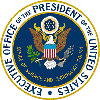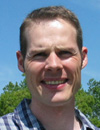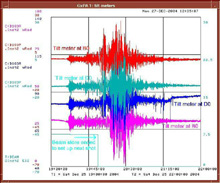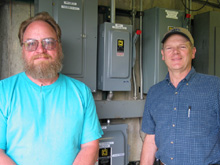 | Monday, June 6, 2005 |
|
Monday, June 6 THERE WILL BE NO PARTICLE ASTROPHYSICS SEMINAR THIS WEEK 3:30 p.m. DIRECTOR'S COFFEE BREAK - 2nd Flr X-Over 4:00 p.m. All Experimenters' Meeting - Curia II Special Topic: PBar Source Diagnostics
Tuesday, June 7 |
|
Extended Forecast |
Secon Level 3 |
|
Monday, June 6 Wisconsin Cheese Soup Corned Beef Reuben $4.85 Chicken Provencale $3.75 Shepherd's Pie $3.75 BBQ Panini with Pepper Jack Cheese $4.85 Meat Lovers Pizza $3.00 Kung Pao Chicken with Peanuts & Scallions $4.85 The Wilson Hall Cafe now accepts Visa, Master Card, Discover and American Express at Cash Register #1.
Wilson Hall Cafe Menu |
| Fermilab Today is online at: http://www.fnal.gov/today/ Send comments and suggestions to today@fnal.gov Fermilab Today archive Fermilab Today PDF Version Fermilab Result of the Week archive Fermilab Safety Tip of the Week archive Linear Collider News archive Fermilab Today classifieds Subscribe/Unsubscribe to |
|
OSTP's Looney To Speak Wednesday, 8:30 a.m. Patrick Looney, Assistant Director for Physical Sciences and Engineering of
|
|
Alvin Tollestrup Award to
Schwienhorst of DZero Reinhard Schwienhorst will receive the Alvin Tollestrup Award for Postdoctoral Research at the 2005 Users' Meeting. A co-convener of the Single Top Working Group at DZero, Schwienhorst has spent the
"Reinhard has taken on a very challenging task and shown great enthusiasm, leadership, and ability to bring new ideas to bear on the problem of seeing the production of single top quarks," said John Conway, chair of the Alvin Tollestrup Award committee. "We believe that the techniques he has developed are the best hope for seeing this at the Tevatron some day." Schwienhorst's team has set upper limits on the production cross section, which indicates the probability that a single top quark is produced. These limits are a factor of two more sensitive than any previous limits. "We will be able to actually observe single top quark production - but it will require a lot of effort," Schwienhorst said. The observation of top quark production will provide otherwise inaccessible insight into electroweak interactions and physics beyond the Standard Model. Schwienhorst describes the search for the single top quark as not only one of the highest priorities for the Tevatron, but also as a personal quest. After reading Faust in school as a child, Schwienhorst became intrigued with a passage in which Faust seeks to "perceive whatever holds / The world together in its inmost folds." This interest in the most fundamental components of matter continues to drive Schwienhorst's studies.
Despite this personal connection to his research, Schwienhorst refuses to take full credit for his award. "This is a reward for the entire group and not just for me exclusively," he said. "This work is the result of the effort of many people, and I have been lucky to be part of a very strong working group."
|
|
From Interactions News Wire, June 3, 2005 Millennium Simulation - the largest ever model of the Universe The Virgo consortium, an international group of astrophysicists from the UK, Germany, Canada and the USA has today (June 2nd) released first results from the largest and most realistic simulation ever of the growth of cosmic structure and the formation of galaxies and quasars. In a paper published in Nature, the Virgo Consortium shows how comparing such simulated data to large observational surveys can reveal the physical processes underlying the build-up of real galaxies and black holes. Read more |
|
Energized Circuits | ||
| ||
|
As a general rule, work on energized electrical circuits is dangerous and
something to be avoided. The associated hazards can include electrical
shock, electrocution, arc flash and even explosion depending on the level
of available hazardous electrical energy. While it is necessary at times
to measure, test and troubleshoot energized circuits, the vast majority
of electrical work at Fermilab is performed on de-energized circuits.
A recent electrical arc injury elsewhere within the DOE science complex has led to an increased awareness of electrical safety at Fermilab. In that incident, an electrical worker suffered severe burns as a consequence of changing a circuit breaker in an energized 400 Amp 480 VAC distribution panel. As exemplified by this accident, some of the greatest electrical hazards are faced by electrical workers who work on AC power distribution systems that are energized. The inherent dangers of such work have been long recognized at Fermilab and such activities are the rare exception rather than the rule. Certain "hot work" activities even demand the approval of the area Division/Section Head and the Directorate. In response to the incident, Associate Director Jed Brown tasked the Electrical Safety Subcommittee to review the accident and to apply lessons learned to strengthen Fermilab's Electrical Safety Program. An important result of the Subcommittee's work has been a revision of FESHM Chapter 5042 that concerns AC electrical power distribution safety. The Chapter now clearly states that working on the exposed energized conductors of power distribution equipment is generally prohibited. While the safety record of Fermilab and T&M electrical workers has been exemplary, increased awareness of electrical safety issues by all will serve to help make Fermilab a safer place to work.
Have a great day and let's work safely all week!
|
|
June 1-June 3 - During this 48 hour period Operations established one store that combined with an existing store provided the experiments with approximately 41 hours and 48 minutes of luminosity. - Booster chopper and notcher problems - Power supply holds off NuMI
Read the Current Accelerator Update |
|
Register for the 2005 Fermilab Users' Meeting It's not too late to register for the 2005 Fermilab Users' Meeting. Join us for: - Presentations from representatives of DOE, NSF and OSTP, with Q&A - Latest results from Fermilab experiments - An insider's view of the EPP 2010 panel - Status of future initiatives at the lab and in HEP as a whole - Free catered dinner at the Users Center...but only if you REGISTER! Registration is free, and can be done online at the Users' Meeting Web site.
Accelerated C++ Short Course
Scottish Country Dancing
Wisconsin Dells Coupon Book |



